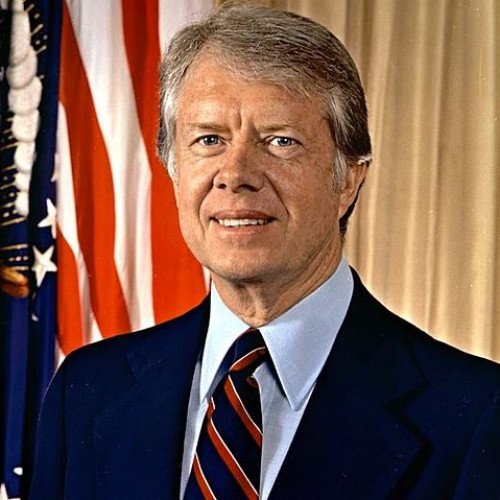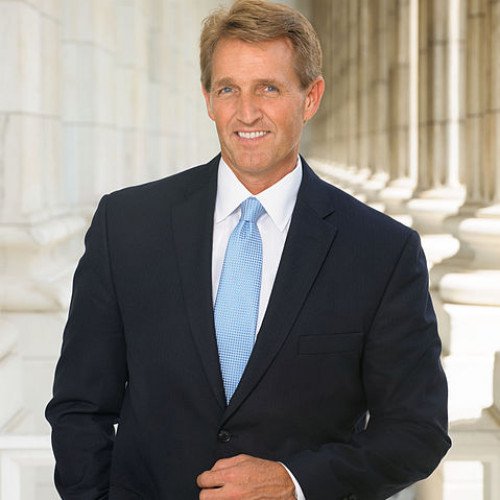Jimmy Carter VS Jeff Flake

Jimmy Carter
James Earl Carter Jr. (born October 1, 1924) is an American politician and philanthropist who served as the 39th president of the United States from 1977 to 1981. A member of the Democratic Party, he previously served as a Georgia State Senator from 1963 to 1967 and as the 76th governor of Georgia from 1971 to 1975. Since leaving the presidency, Carter has remained engaged in political and social projects as a private citizen. In 2002, he was awarded the Nobel Peace Prize for his work in co-founding the Carter Center. Raised in Plains, Georgia, Carter graduated from the United States Naval Academy in 1946 with a Bachelor of Science degree and joined the United States Navy, where he served on submarines. After the death of his father in 1953, Carter left his naval career and returned home to Georgia to take up the reins of his family's peanut-growing business. Carter inherited comparatively little due to his father's forgiveness of debts and the division of the estate among the children. Nevertheless, his ambition to expand and grow the Carters' peanut business was fulfilled. During this period, Carter was motivated to oppose the political climate of racial segregation and support the growing civil rights movement. He became an activist within the Democratic Party. From 1963 to 1967, Carter served in the Georgia State Senate, and in 1970, he was elected as Governor of Georgia, defeating former Governor Carl Sanders in the Democratic primary on an anti-segregation platform advocating affirmative action for ethnic minorities. Carter remained as governor until 1975. Despite being a dark-horse candidate who was little known outside of Georgia at the start of the campaign, Carter won the 1976 Democratic presidential nomination. In the general election, Carter ran as an outsider and narrowly defeated incumbent Republican President Gerald Ford. On his second day in office, Carter pardoned all the Vietnam War draft evaders by issuing Proclamation 4483. During Carter's term as president, two new cabinet-level departments, the Department of Energy and the Department of Education, were established. He established a national energy policy that included conservation, price control, and new technology. In foreign affairs, Carter pursued the Camp David Accords, the Panama Canal Treaties, the second round of Strategic Arms Limitation Talks (SALT II), and the return of the Panama Canal Zone to Panama. On the economic front, he confronted stagflation, a persistent combination of high inflation, high unemployment and slow growth. The end of his presidential tenure was marked by the 1979–1981 Iran hostage crisis, the 1979 energy crisis, the Three Mile Island nuclear accident, and the Soviet invasion of Afghanistan. In response to the invasion, Carter escalated the Cold War when he ended détente, imposed a grain embargo against the Soviets, enunciated the Carter Doctrine, and led a 1980 Summer Olympics boycott in Moscow. In 1980, Carter faced a challenge from Senator Ted Kennedy in the primaries, but he won re-nomination at the 1980 Democratic National Convention. Carter lost the general election to Republican nominee Ronald Reagan in an electoral landslide. He is the only president in American history to serve a full term of office and never appoint a justice to the Supreme Court. Polls of historians and political scientists usually rank Carter as a below-average president. Carter's activities since leaving the presidency have been viewed more favorably than his presidency itself. In 1982, Carter established the Carter Center to promote and expand human rights. He has traveled extensively to conduct peace negotiations, monitor elections, and advance disease prevention and eradication in developing nations. Carter is considered a key figure in the Habitat for Humanity charity. He has written over 30 books, ranging from political memoirs to poetry, while continuing to actively comment on ongoing American and global affairs such as the Israeli-Palestinian conflict.
Statistics for this Xoptio

Jeff Flake
Jeffry Lane Flake (born December 31, 1962) is an American politician who served as a United States Senator from Arizona from 2013 to 2019. A member of the Republican Party, Flake served in the United States House of Representatives from 2001 to 2013. Born in Snowflake, Arizona, Flake attended Brigham Young University, from which he received his Bachelor of Arts degree in international relations, and later his Master of Arts degree in political science. In the early 1980s, he became a missionary for The Church of Jesus Christ of Latter-day Saints in South Africa, where he learned to speak Afrikaans. After returning to the United States, Flake served as Executive Director of the Goldwater Institute, before being elected as a Republican to the House of Representatives from Arizona's 1st congressional district in 2001. He served as the representative for the 1st district until renumbering following the 2000 census redefined the district to be Arizona's 6th congressional district, which he then represented until he entered the Senate in 2013. Flake sought the Republican nomination for the 2012 Senate election after incumbent Jon Kyl announced his retirement. He defeated Democratic candidate and former United States Surgeon General Richard Carmona in the general election. Flake was one of the bipartisan "Gang of Eight" U.S. senators that pushed an immigration reform bill through the Senate in 2013. He is known as a vocal critic of President Donald Trump, but generally voted in line with Trump's positions. On October 24, 2017, Flake announced that he would not seek re-election in 2018.Throughout his Senate career, Flake suffered from consistently low approval ratings. In April 2013, less than three months after taking office, he had 32% approval and 51% disapproval ratings. By mid-2017, he dropped to 18% approval and 62% disapproval ratings, but recovered slightly near the end of his term, with 30% approval and 51% disapproval ratings as of July 2018.On January 29, 2019, Flake was hired by CBS as a contributor for CBS News. He regularly appears on CBS This Morning and CBS Evening News.